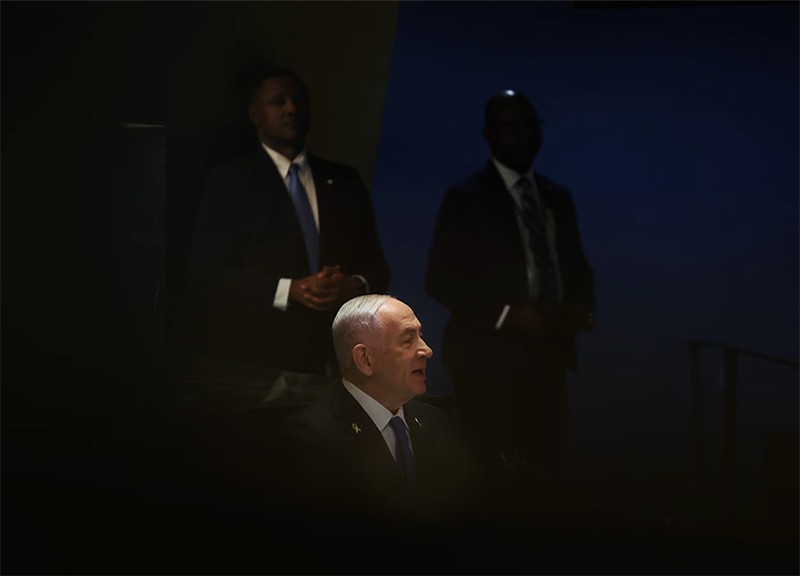
Israeli prime minister is expecting a freer hand from Washington as he pursues conflicts in Gaza, Lebanon and with Iran
By Anat Peled. WSJ.
TEL AVIV-Two significant constraints on Israeli Prime Minister Benjamin Netanyahu's ability to shape security policy are now gone.
He fired his defense minister, Yoav Gallant, his fiercest opponent within his own government, and Donald Trump won the U.S. election. Trump is widely believed to be less critical of Netanyahu's policies than his opponent, Vice President Kamala Harris.
Both domestically and internationally, Netanyahu now has more room to maneuver.
Gallant, reflecting the view of Israel's military, had been pushing publicly for the prime minister to accept a truce in exchange for a hostage-release deal, bring in Palestinian leadership that could succeed Hamas in Gaza and begin cease-fire talks in Lebanon. Netanyahu, who calls for "total victory" in the war, has said Israel can't stop fighting in Gaza until Hamas is destroyed. He has rejected pressure domestically and from the U.S. to accept a deal that would end the war.
Harris was expected to continue the Biden administration's policies toward Israel, which included applying pressure to provide more humanitarian aid to Gazans or face threats of being cut off from U.S. shipments of weapons. Washington also is pushing for a truce deal in Gaza and Lebanon.
Netanyahu said Trump's win is "a powerful recommitment to the great alliance between Israel and America.'
In addition to allowing Israel to prosecute its wars more freely, Trump is unlikely to continue the Biden administration's policy of imposing sanc tions on violent Israeli settlers in the West Bank. The leader of one of the largest settler umbrella organizations said a Trump win takes "the threat of a Palestinian state off the table." Polls in Israel showed that a wide majority of Israelis favored Trump over Harris.
"This is an important milestone for him," as Netanyahu believes his position has strengthened vis-à-vis the world, and that this will give him more control in running the war, said Gideon Rahat, senior fellow at the Israel Democracy Institute.
Some analysts say Trump's policy positions on Israel are still murky. He has said he doesn't want a regional war, and thinks Israel should wrap up its fight in Gaza before he assumes office. With Trump set to take his position in January, it also remains unclear if U.S. policy toward Israel would change in the next few months.
Netanyahu fired Gallant on Tuesday after months of disagreement, and what he said was a breakdown of trust be tween the two men who are barely on speaking terms, people familiar with the matter said. Thousands of Israelis took to the streets of Tel Aviv and other Israeli cities to pro- test Gallant's ouster.
Several petitions were submitted on Wednesday to the Israeli High Court of Justice, challenging Gallant's dismissal on the grounds that the prime minister's decision was extremely unreasonable, a legal cause of action in Israeli administrative law for overturning a government decision. The decision to fire Gallant also reflected a deep divide between the prime minister and Israel's security establishment, which worries about the military being stretched on several fronts. Gallant was the chief proponent of the military's view within the government. Without him, Netanyahu can have near total control over the war policy.
Gallant's successor, the current foreign minister, Israel Katz, is viewed as a close Netanyahu ally who wouldn't take an independent stance on the war aims.
The Biden administration and its European allies considered Gallant a trusted counterpart amid the White House's growing frustration at Netanyahu over attempts to reach a cease-fire in Gaza and an expanding war in the Middle East with no clear end in sight.
But with Trump's victory, Netanyahu is likely to gain an administration in the White House that is less critical of his conduct. Some analysts say Netanyahu was hoping for a Trump victory, in part because he has long identified with and shared Republican views.
A U.S. official called the decision to fire the defense minister concerning. Gallant was the most vocal advocate of a truce in Gaza and often served as a counterweight to a harder line pushed by Netanyahu in talks, humanitarian aid and the day after in Gaza.
A key driver for the ousting was domestic politics, specifically Netanyahu's need to pass a bill to exempt ultraorthodox men from military service, something Gallant opposed because of manpower issues in the Israeli military.














